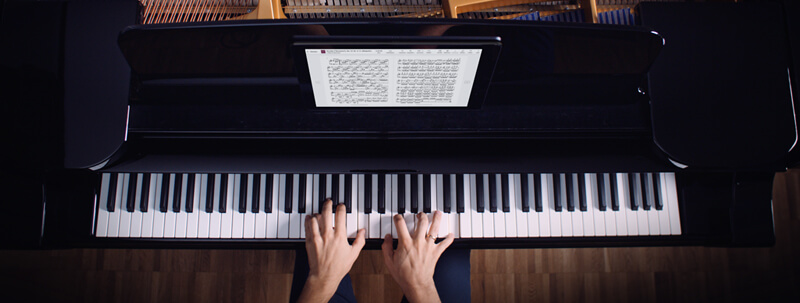How to Perfectly Play 10 Schubert Songs on Your Piano

Jump to section
You get a fascinating chord poster + exclusive content!
Ave Maria
Ave Maria by Franz Schubert, composed in 1825 as part of his Opus 52, is a hymn to the Virgin Mary. The piece, originally written for voice and piano, is renowned for its stunningly simple yet moving melody. A must-play.
Ständchen (Serenade) D. 957 No. 4
Ständchen (Serenade) D. 957 No. 4 is a charming masterpiece by Franz Schubert. Famed for its delicate, yet emotive piano accompaniment, it serves as the sublime canvas for Schubert's lyrical gift, offering piano players a rich furrow of expressive potential.
Here is the sheet music for Ständchen (Serenade) D. 957 No. 4!
The Trout (Die Forelle), D. 550 Op. 32
The Trout (Die Forelle), D. 550 Op. 32 by Franz Schubert is a lyrical composition, originally for a string quintet. The trout's lively movements are depicted through evocative melodies, making it a stimulating piece for musicians. In this version for piano, as in any other, the song is a testament to Schubert’s ability to combine poetic imagery with musical motifs.
Here is the sheet music for The Trout (Die Forelle), D. 550 Op. 32!
The Tailor's Polka
The Tailor's Polka by Franz Schubert is a lively and upbeat piece, reflecting the traditional Polish dance in its rhythm and structure. Its arrangement for piano can provide an engaging experience for piano players, showcasing the capability of the instrument in conveying the energy and motion of the polka.
Hungarian Melody, D 817
The 'Hungarian Melody, D 817' by Franz Schubert is a compelling piano piece that reflects the influence of Hungarian folk music on the composer of the Romantic age. This striking work showcases Schubert's lyricism and emotional depth, offering a delightful experience for piano players.
Heidenröslein, Op. 3: No. 3
Heidenröslein, Op. 3: No. 3 by Franz Schubert, is a delicate yet captivating piece. It showcases the soothing timbre of the piano, serving as a melodic bed for the narrative. The intricate phrases accentuate the song's emotion, making it a must-learn for piano players.
German Dance, D 783 No. 7
German Dance, D 783 No. 7, characterized by Franz Schubert's quintessential lyricism, is a piece that piano players may find engaging. It features a well-structured melody, rendered through the piano, that embodies the spirit of traditional German dances. The piano composition is simple yet expressive, making it a delight for pianists.
3 Piano Pieces, D 946: 2. Allegretto
Franz Schubert's '3 Piano Pieces, D 946: 2. Allegretto' is a compelling expression of his mastery in piano composition. Its melody showcases complexities that resonate vividly with piano players. Reflecting his profound passion for piano, its remarkable arrangement engages the listener in a deep, emotive dialogue. Its distinctiveness lies in the precise blending of the piano's tonalities, producing an enchanting auditory experience. The depth and beauty of this piece truly epitomize Schubert's genius.
Here is the sheet music for 3 Piano Pieces, D 946: 2. Allegretto!
8 Ländler in B-flat Major, D 378
The '8 Ländler in B-flat Major, D 378' by Franz Schubert is delightful, and known for its simplistic beauty that resonates with piano players. Its melody is portrayed predominantly through the piano, making it a significant piece for pianists to study and perform.
Here is the sheet music for 8 Ländler in B-flat Major, D 378!
Lullaby, D 498 - Op. 98 No. 2
Lullaby, D 498 - Op. 98 No. 2 is a lyrical composition by Franz Schubert. Written in 1816, it showcases Schubert's mastery of developing melodies. This piece is loved by piano players for its beautiful, flowing, yet challenging piano accompaniment. Its soothing tune embodies the essence of a lullaby.
Conclusion
Playing Franz Schubert's music is not just about obtaining technical skill; it's an exploration into the heart of one of music's genius minds. These ten songs give you a glimpse into Schubert's mastery and provide a road map for your development as a pianist. Consistently practicing and working through these songs elevate your understanding of the keyboard and music implementation. So, take your time mastering each song, learning every note, phrase, and voicing; it's your journey through the world of Schubert.


